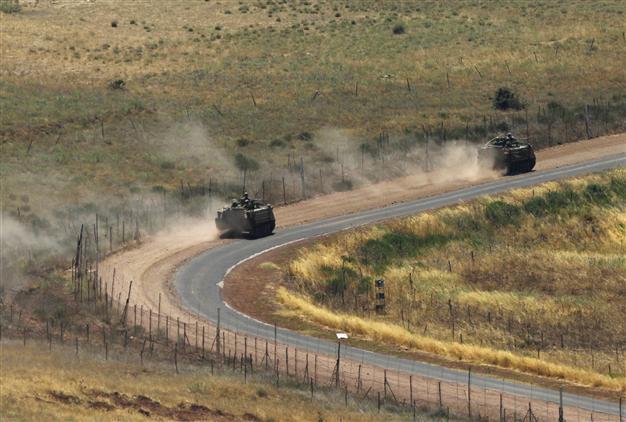Syria rebels say chemical weapons moved to borders
DAMASCUS - Agence France-Presse

REUTERS Photo
Syrian rebels have accused strongman Bashar al-Assad of moving chemical weapons to the country's borders, after his beleaguered regime said it would use its stockpiles if attacked.The accusation came as helicopter gunships strafed rebel neighbourhoods of second city Aleppo, Syria's commercial capital, pro-government media said Tuesday.
The Syrian Observatory for Human Rights said at least 108 people were killed in violence on Tuesday across the country.
The rebel Free Syrian Army said the chemical arsenal had been moved in a bid to pressure the world community, much of which has called for Assad to step aside in the face of the more than 16-month uprising against his rule.
"According to our information, the regime began moving its stocks of weapons of mass destruction several months ago... with the goal of putting pressure on the region and the international community," said the FSA.
"We also reveal that Assad has transferred some of these weapons and equipment for mixing chemical components to airports on the border," it added.
Foreign ministry spokesman Jihad Makdissi acknowledged on Monday that Syria has chemical weapons and said the regime would use them if attacked by outsiders, although not against its own civilians.
US President Barack Obama warned Assad not to make the "tragic mistake" of unleashing chemical weapons.
"Given the regime's stockpile of chemical weapons, we will continue to make it clear to Assad and those around him that the world is watching," said Obama.
Russia reminded Syria that it had joined a Geneva protocol on the non-use of such weapons.
On the political front US Secretary of State Hillary Clinton insisted that President Assad must hand over power and said Washington was stepping up its support for the opposition.
"We have to work closely with the opposition because more and more territory is being taken and it will eventually result in a safe haven inside Syria which will then provide a base for further actions by the opposition," she said.
"We do believe that it is not too late for the Assad regime to commence with planning for a transition to find a way that ends the violence." The opposition Syrian National Council, for its part, said only an opposition figure should lead a transition government if the regime falls.
A Council statement also said the uprising was "about to achieve victory against the murderous junta in power." And Prime Minister Recep Tayyip Erdogan of neighbouring Turkey, which hosts the rebel leadership, said he was confident it was close to victory.
"The ruthless killings committed in panic in recent days show the world that the Syrian regime is on the road to oblivion," he said.
Activists and regime sources say government forces have reclaimed most of Damascus after a week of heavy fighting with rebels, who remain in the city but are planning a guerrilla strategy.
Clashes continued Tuesday, with the Syrian Observatory for Human Rights reporting that 71 civilians, 28 soldiers and nine rebels were killed across Syria.
A video it distributed showed the bodies of dead children, including a young girl in a pink and white dress, lying on a blood-smeared floor, said to be in the besieged town of Herak.
In Aleppo, the Observatory said helicopter gunships fired on the districts of Qadi Askar, Bab al-Hadid, Al-Katergi and Karam al-Jabal.
A rebel spokesman said that a "large number" of regime forces had been moved from the northwestern province of Idlib to fight in Aleppo, which recently became a new front in the country's 16-month uprising against the Assad regime.
Meanwhile, Syria named General Ali Mamluk the new head of its National Security office in a shake-up after a bombing killed four top regime figures, an official told AFP.
"General Ali Mamluk, who was head of state security, is becoming the head of the Bureau of National Security, with the rank of minister, overseeing the entire security apparatus," said the source.
Also on Tuesday, UN peacekeeping chief Herve Ladsous arrived in Damascus, where the new head of a UN observer mission, General Babacar Gaye, was due later in the day.
Syria also appeared to suffer a new blow on Tuesday as the head of its mission in Cyprus, Lamia al-Hariri, defected to Qatar, Arab television networks reported.
If confirmed, Hariri's defection would be the second of its kind following that of Nawaf Fares who this month renounced his post as ambassador in Iraq and joined rebel ranks.
One official who has definitely changed sides, General Manaf Tlass, called on Syrians to unite and start building a post-Assad future, in his first public appearance since defecting from the regime.
Reading a prepared statement on the Saudi-based Al-Arabiya television channel, Tlass called on Syrians to "unite... to serve a Syria after Assad... and do the impossible, to ensure the unity of Syria, and to be sure to start building a new Syria." Tlass, who defected on July 6, said he was "the blood of its innocents is being shed."
















